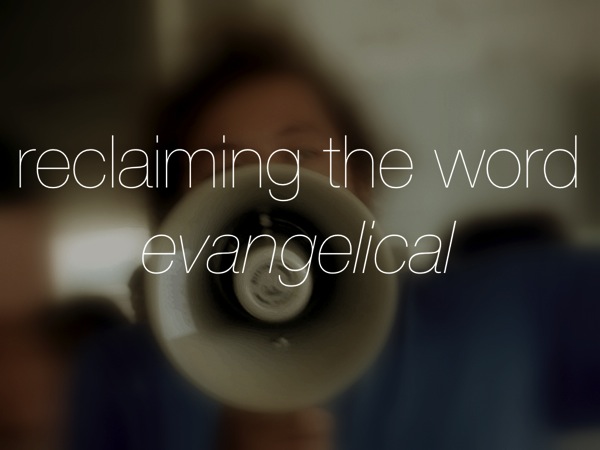 The word “evangelical" gets a bad rap. It’s used to describe political agendas, a style of worship, or perhaps even a backhanded way to call someone a fundamentalist, a legalist, or out-of-touch with our current world. It’s ironic that a word which is derived from “Gospel” or “Good News” can so easily send people running. If an “evangelical” is really one who clings to the message of Christ’s death and resurrection for the forgiveness of sins, then evangelicals should be a group of people you'd like to be around.
The word “evangelical" gets a bad rap. It’s used to describe political agendas, a style of worship, or perhaps even a backhanded way to call someone a fundamentalist, a legalist, or out-of-touch with our current world. It’s ironic that a word which is derived from “Gospel” or “Good News” can so easily send people running. If an “evangelical” is really one who clings to the message of Christ’s death and resurrection for the forgiveness of sins, then evangelicals should be a group of people you'd like to be around.
But there's a reason why Rob Bell when pressed about his identification with the word evangelical once responded, “If An evangelical is somebody who, when they leave the room, you feel better because you heard the good news [from them], then yes.” Because this is not what people typically think of when they think of the word evangelical. And while I certainly don’t agree with Rob on a lot of issues, he accurately perceives that most people don’t think Good News and Evangelicals belong in the same sentence.
There was a time when the word evangelical was used to describe the distinction from the catholic church.
“[Evangelicals] were also the first to emphasize the Gospel to such an extent that it became central to every level of their doctrine and practice. This evangelical focus, made over against medieval Catholicism, opened the door to every other Protestant expression that came later.” - Gene Veith
What Kind of Evangelicals Do We Need?
We need to evangelicals who are about emphasizing God’s words - we are sinners in need of a savior and Christ declares that “It is finished." It’s not about political agendas or styles, but the centrality of the Gospel to every doctrine and practice of the church.
It’s interesting to note that even Luther himself didn’t want to call himself Lutheran but instead evangelical.
Christians have always been people who are about the message of the Gospel. In the New Testament, in the early church, in the middle ages, and in the days of the reformation - it has always been about the Gospel.
"For what I received I passed on to you as of first importance: that Christ died for our sins according to the Scriptures, that he was buried, that he was raised on the third day according to the Scriptures, and that he appeared to Cephas, and then to the Twelve. After that, he appeared to more than five hundred of the brothers and sisters at the same time, most of whom are still living, though some have fallen asleep. Then he appeared to James, then to all the apostles, and last of all he appeared to me also, as to one abnormally born. - 1 Corinthians 15:3-8
There was a group of people who witnessed the death and resurrection of Jesus. They saw him alive after he had died. And then they pass on that message as it is “of first importance.”
We have that same message. A promise that sins are forgiven. A promise that death has been defeated. A promise that you are made new. A promise that Christ was victorious. A promise that is good news for all people. A message that is the most important message around.
This message is what makes an evangelical.
Evangelicals are those who seek to see the Gospel reach a dying, dark world.
"There is no saving doctrine except the Gospel; everything else is night and darkness." -Luther
This message is Good News. It is not news that you need to earn. It’s not news that gets you votes. It’s not news that gives to you exactly what it promises, the forgiveness of sins by faith in the finished work of Jesus.
I am an evangelical.
And It’s not because of a political stance. It’s not because of a style of music or the preachers or books I read. It’s because what we have received I want to pass on as the most important message of all.
